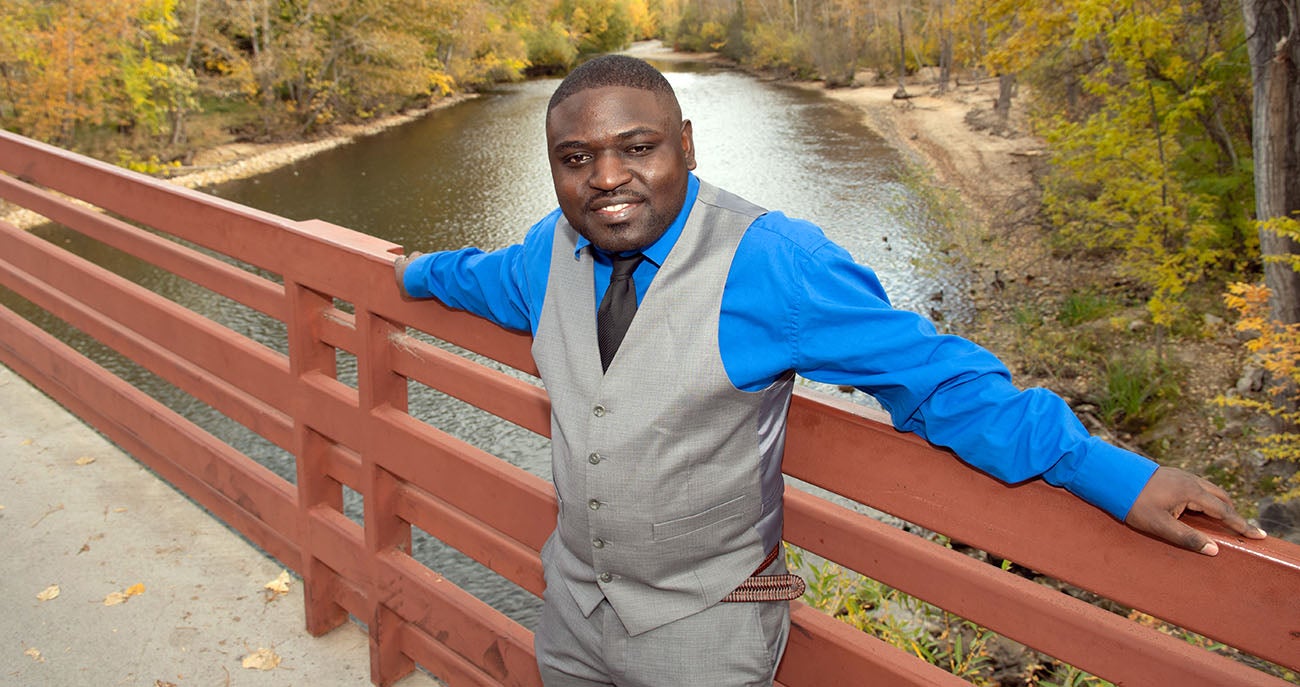
True strength is measured not only by a person’s ability to overcome great struggles, but by their determination to turn and grasp the hands of those who still struggle. Boise State University senior Shukuru Kamulete is an example of such strength.
Kamulete came to Boise at age 14 as a refugee from the Democratic Republic of Congo and now is gearing up to graduate from the social work program at Boise State. Working under the mentorship of assistant professor of psychology April Masarik, Kamulete is supporting a team of Boise State faculty who are conducting research on refugee resilience and stressors in the American education system. Kamulete is supporting the research with his talents as an interpreter. In addition to English, he also speaks Swahili, Kibembe (a language found in Congo) and French.
“At our initial meeting, when I told him about my research, Shukuru said, ‘I want to get involved. I don’t know much about research but I know Swahili and I want to help. Teach me,’” Masarik recalled. “This is Shukuru… he wants to help and get involved. He serves the community, he is a learner, a courageous leader and positive role model.”
Kamulete also has worked with Masarik to create focus groups of Boise State students who identify as refugees in order to ascertain what stressors caused them to struggle, as well as what helped them to be resilient in college.
“As a refugee myself, I understand the struggle we go through in our everyday lives, especially here at Boise State,” said Kamulete. “There are a lot of us. I didn’t know that there were that many refugees in the student body.”
According to the Division of Student Affairs and Enrollment Management, 192 students who self-identified as refugees were enrolled at Boise State for the fall 2019 semester.
On campus, Kamulete is a leader in the The Multilingual Students Alliance, a student organization run by students who have a refugee background and rely on the group for support and other resources. Kamulete and another student, Fowzia Adan, organize events to build community among members.
“We hope to advocate for students, serve as mentors for other students, educate people about strengths and issues of refugee and minority students, and enhance understanding and cooperation between traditional students and professors here at Boise State,” Kamulete said.
“In his ‘free time,’ Shukuru is out in the community, helping recently arrived refugees navigate the grocery store, the Department of Motor Vehicles and doctor’s appointments. When does he sleep? What amazes me the most is that despite his active social and professional life, he is always calm and collected,” Masarik said. “And his laugh is contagious!”
From picking up incoming refugees at the airport, to teaching them how to pay their power bill and to drive with their new permits, to familiarizing them with the English language and American traditions and institutions, Kamulete has supported refugees in Boise in many ways, all while pursuing a degree, interning and aiding important research.
Kamulete has high hopes for the team’s research, not only that it will pave the path of the refugees who are participating in the study and those to come, but that it will give them an opportunity to reveal their incredible resilience.
“Half the time, we are focusing on the negative, but I hope that the families can showcase their strength in the research,” he said.
As more refugees seek safety and refuge in Boise and in Idaho, Kamulete offered two tips that anyone can implement to help newcomers feel welcome and happy in their new homes.
“Just be open-hearted and willing to listen to them. If we don’t talk to them and try to understand, nothing can ever change. And advocacy: not everyone is willing enough to really speak up to these issues. Use your voice to do what you can.”